|
Getting your Trinity Audio player ready... |
Tabla de Contenido/ Table of Contents
- 1 Kevin Marino Cabrera and Daniella Levine Cava and Modified Ordinance No. 19-122. Objectives?
- 2 Alleged violation of Ordinance No. 19-122 from December 2019 to the present
- 2.1 Does the report truly meet the standards established following the ordinance’s modification?
- 2.2 Critical Questions on Compliance with the Ordinance and Transparency
- 2.3 Reflection on the County Structure and Its Transparency
- 2.4 3. Conclusions
- 2.5 Get Involved and Make Your Voice Heard in Miami-Dade!
Kevin Marino Cabrera and Daniella Levine Cava and Modified Ordinance No. 19-122. Objectives?
Main Changes in the Ordinance. The Role of Kevin Marino Cabrera and Daniella Levine Cava in These Acts.
At the December 3, 2019 meeting of the County Board of Commissioners (hereinafter, the “Board”), Board members adopted Ordinance No. 19-122, which approved the Miami-Dade Aviation Department (MDAD) Capital Improvements Acceleration Ordinance (hereinafter, the “Acceleration Ordinance”). This ordinance streamlines the process for the award and administration of contracts for the design and construction of capital facilities, such as terminals, concourses, ramps, parking facilities, and hotels at Miami International Airport (MIA) and the General Aviation Airports (GAA).
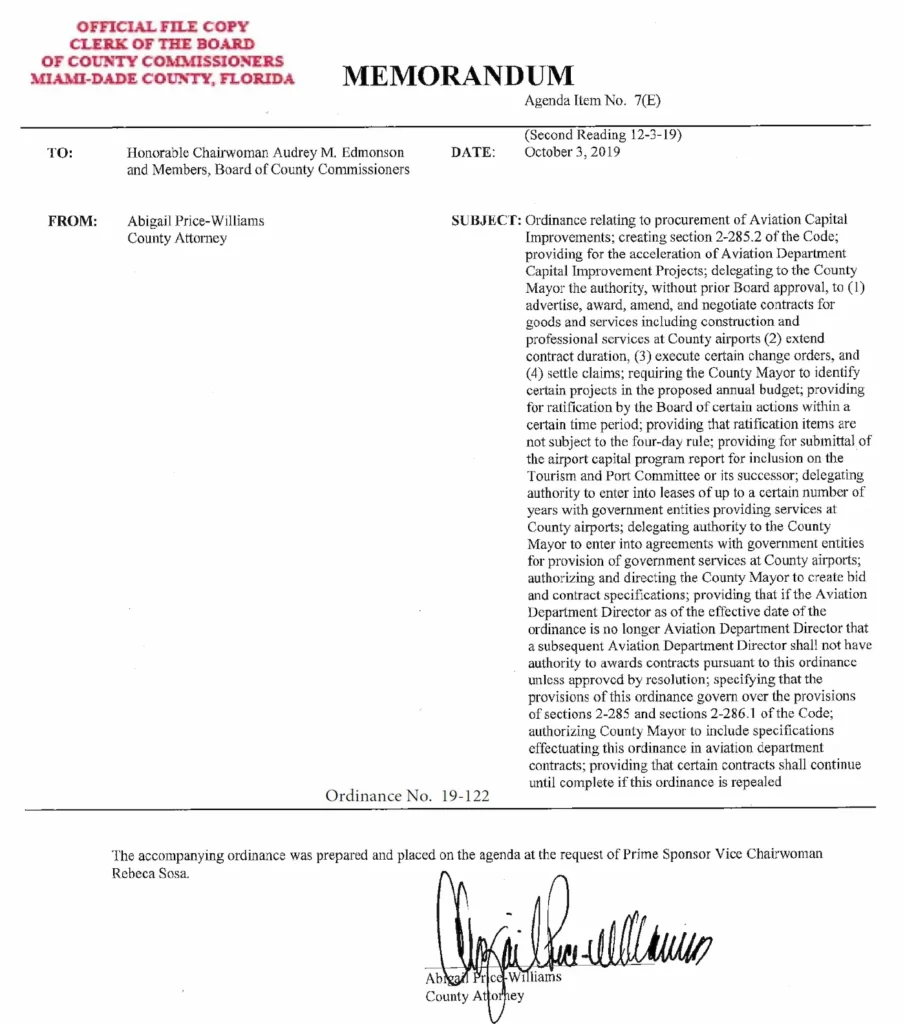
The Acceleration Ordinance requires the monthly submission, every 30 days, of a report called the “Aviation Capital Program Report” on the Board’s agenda, containing information on:
- Procurement activities that are announced or made public under the authority of Ordinance No. 19-122, including upcoming contract advertisements, the estimated value of those contracts, the qualifications required for the award beyond the necessary licenses, as well as proposed procurement measures (Small Business Enterprise, Community Enterprise, or Disadvantaged Business Enterprise goals).
- Active capital projects, identified by number, title, phase, estimated completion date, original budget amount, current budget amount, previous month’s expenditures, current month’s expenditures, and total cumulative expenditures. Indicators must also be included to inform Board members when each capital project’s expenditures reach 30%, 60%, and 90% of the approved budget, accompanied by a comment section to explain any variances.
The Department has placed its forty-fifth “Aviation Capital Program Report” on today’s agenda—as an attached document—prepared to promote transparency and accountability by providing residents and Board members with open and easy access to key information regarding MDAD’s procurement processes and the financial status of its capital projects. This report can be viewed monthly on MDAD’s webpage:
http://www.miami-airport.com/transparency_report.asp
Each monthly report will be posted simultaneously with the inclusion of the “Aviation Capital Program Report” on one of the Board committee agendas.
Since October 2020, when Daniella Levine Cava was already participating in the meetings as mayor, she had full knowledge of Ordinance 19-122. However, its provisions have not been consistently adhered to since that date, which is worrisome given the ordinance’s importance for ensuring transparency and efficiency in the Aviation Department’s projects.
Meanwhile, Commissioner Kevin Marino Cabrera, after taking office, already knew about this ordinance and has been actively involved in matters related to Miami International Airport, regarded as the county’s main economic engine. Even so, doubts remain as to the extent to which the procedures established by this legislation have been correctly implemented or supervised, especially regarding project reporting and accountability.
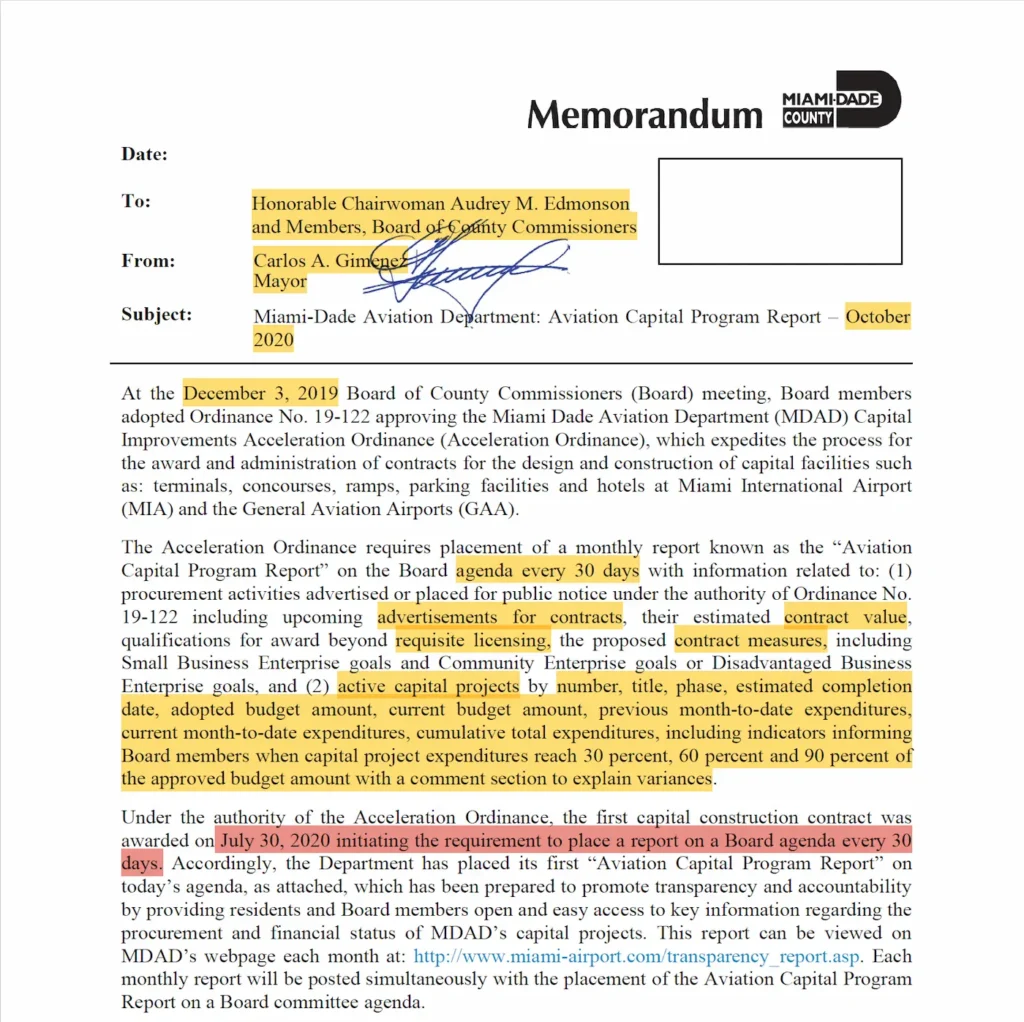
Alleged violation of Ordinance No. 19-122 from December 2019 to the present
Ordinance No. 19-122 established a very clear obligation: to submit, every 30 days, an updated report including the status of MDAD’s capital projects, as well as any published or in-process bids and contracts. However, upon reviewing the sequence of published reports—especially when examining the information available at the official link
https://www.miami-airport.com/transparency_report.asp—from 2020 to August 2024, notable irregularities are observed in the publication:
- Lack of consecutive monthly reports: There is no strict record of reports issued every 30 days on an uninterrupted basis. Over the course of several months or even quarters, the required frequency is not maintained.
- Delays and accumulation of reports: On occasion, multiple reports are published simultaneously after long periods without updates, which violates the directive to keep the Board and the public informed in a timely manner (every 30 days).
- Discrepancies between the issuance dates and the official date of the reports: Several documents show dates that do not match the actual moment of their publication on the website. This makes it difficult to verify the timeliness and consistency of the information.
- Lack of key data in certain reports: Some reports do not include the full information required by Ordinance No. 19-122, such as small business participation targets or details of expenditures in relation to the 30%, 60%, and 90% budget thresholds.
In December 2019, when the ordinance went into effect, it was stipulated that the report had to appear monthly on the Board’s official agenda. However, if each published document is reviewed and compared with the actual frequency of Board meetings, it becomes evident that the timeline and content do not strictly adhere to what was established.
Modifications to Ordinance 19-122
Main Changes in the Ordinance:
- Elimination of the ratification requirement: The modified version removes the need to ratify each federal and state grant applied for or received, streamlining financing processes.
- Expansion of report requirements: The monthly report must include details on improvements, investments, and relevant activities at both Miami International Airport (MIA) and the General Aviation Airports (GAA). Were these requirements in the first ordinance?
- Incorporation of additional metrics: Performance metrics have been added, such as the impact of improvements on efficiency, service expansion, and modernization.
Changes in Scope:
- Prior to the modification, the ordinance focused exclusively on MIA. It now includes GAA as an integral part of the report.
- Sustainability initiatives and technological advances are incorporated. Were these requirements in the first ordinance?
Impact of the Modifications:
- Administrative streamlining allows for faster project execution and receipt of funds.
- Including the GAA ensures a more holistic approach to modernizing the county’s aviation sector. Were these requirements in the first ordinance?
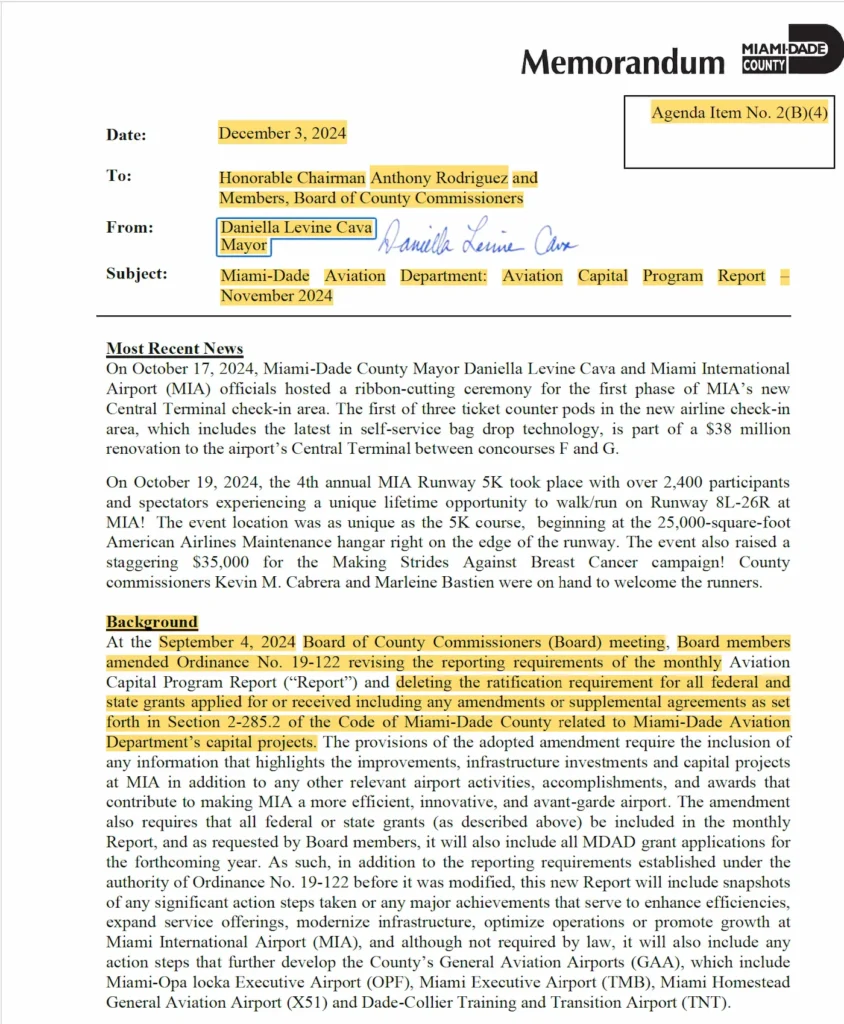
Kevin Marino Cabrera and Daniella Levine Cava and Modified Ordinance No. 19-122.
Why this may be considered a “violation” of the ordinance from its effective date
- Failure to meet deadlines: The ordinance requires presentation and publication every 30 days; however, the reports show gaps for several months.
- Lack of continuous transparency: The purpose of the rule is to provide timely and reliable information to the Board and the public to ensure accountability. Irregularity in delivering reports goes against that goal.
- Legal foundation of obligations: As it is an ordinance adopted by the Board of Commissioners, its breach calls into question the internal oversight processes and the willingness to adhere to approved regulations.
Does the report truly meet the standards established following the ordinance’s modification?
Although the ordinance’s modifications, approved in September 2024, simplified certain procedures and expanded the scope of the report, the report presented in December 2024 appears to show delays and possible inconsistencies in the required frequency. The delayed reports 241529 (August), 241530 (September), 241736 (October), and the current 241978 (November) were simultaneously submitted. This raises significant questions about the effectiveness of the changes implemented and the department’s ability to maintain an effective transparency system.
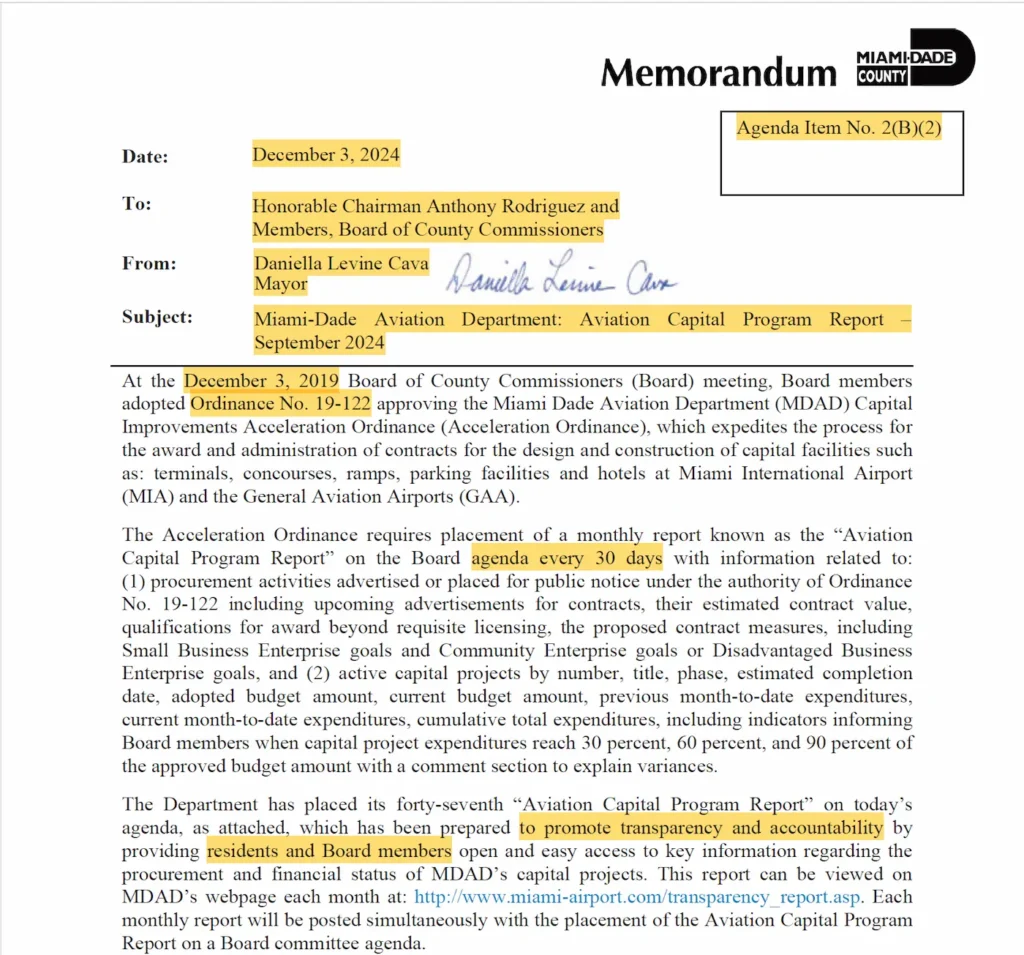
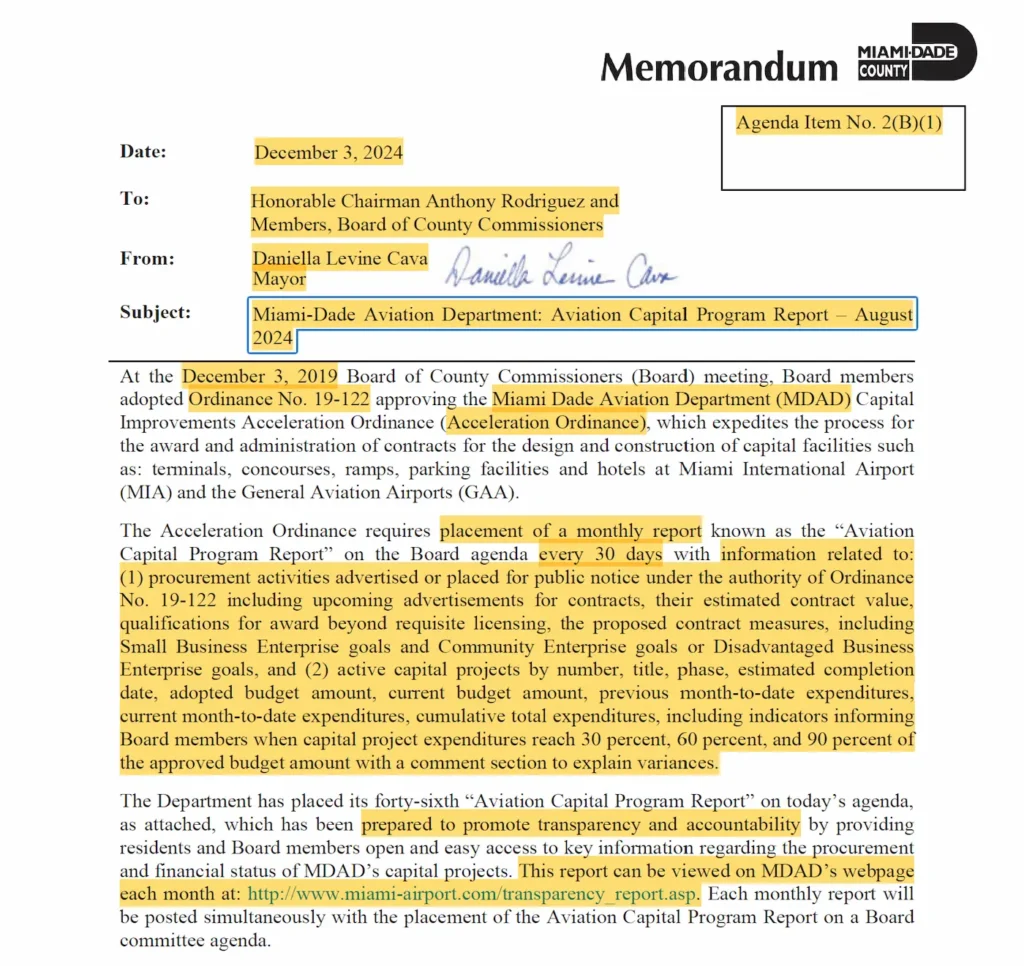
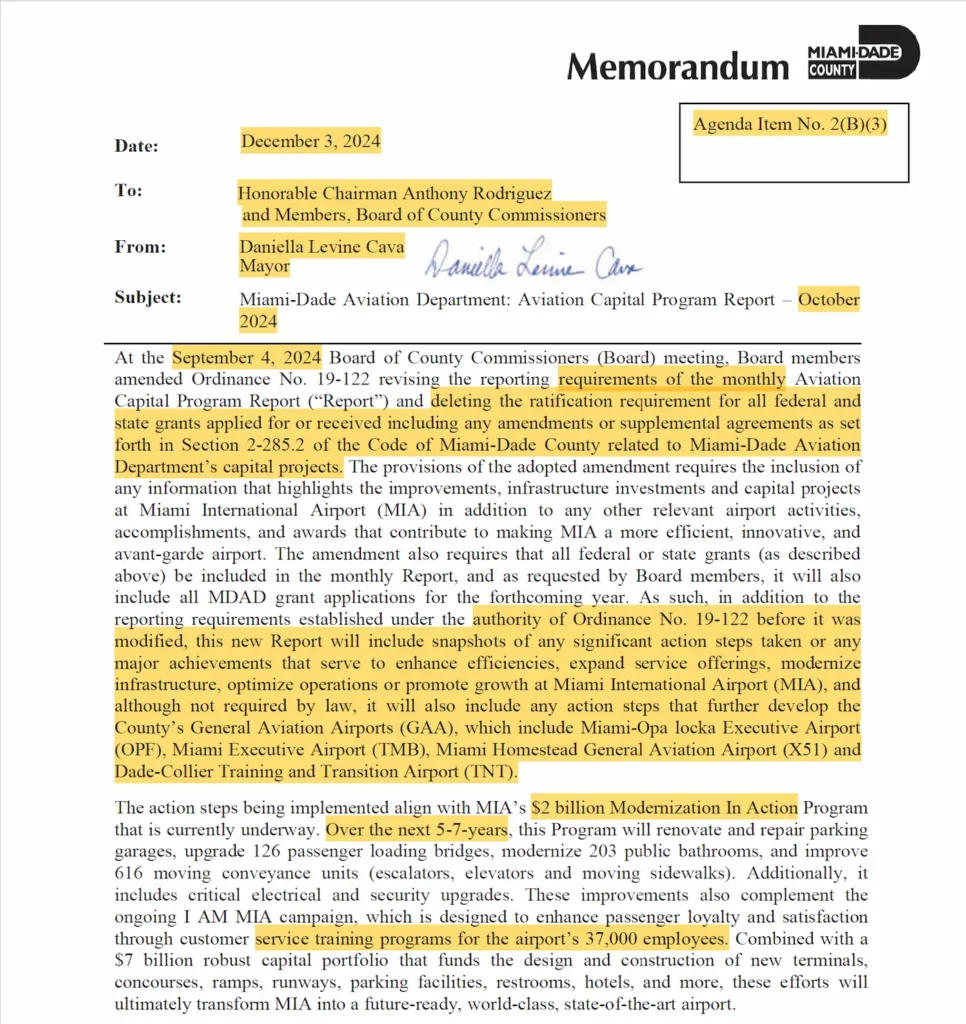
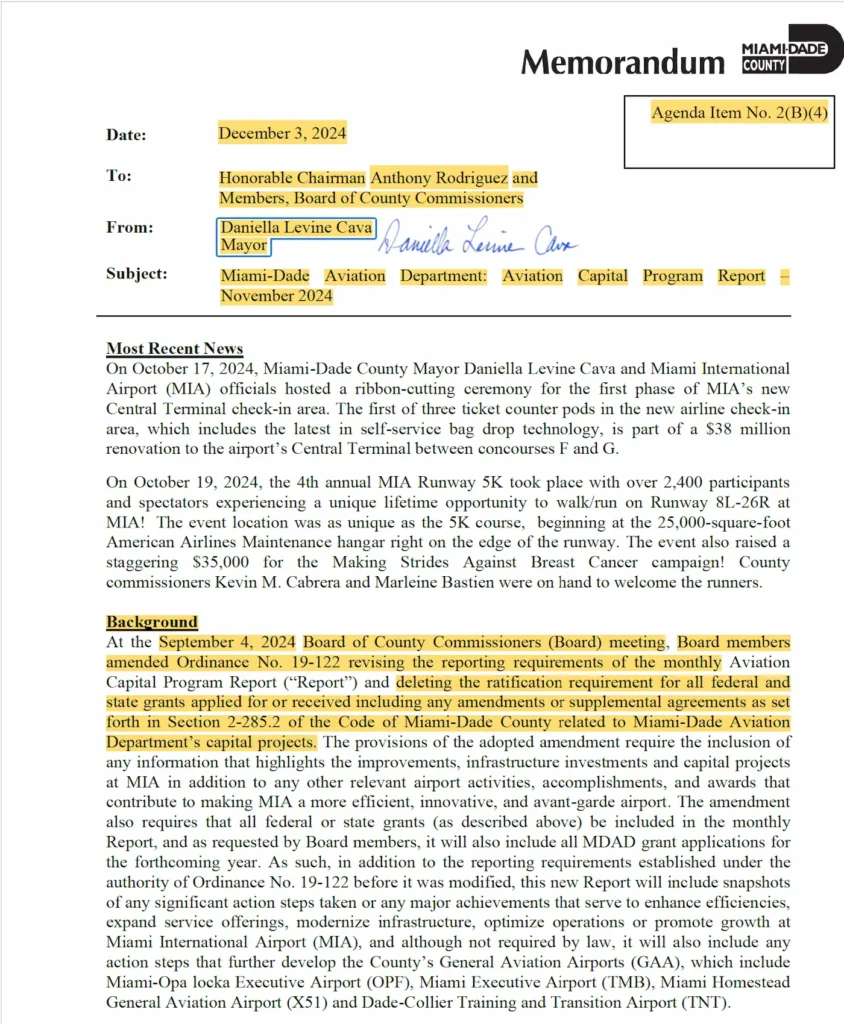
Critical Questions on Compliance with the Ordinance and Transparency
On Updating and Frequency:
- If the ordinance requires timely monthly updates, why does the report presented in December include information for October but not for November or December?
- Were clear internal protocols established to ensure that the report’s frequency meets the standards of the modified ordinance?
On the Impact of the Ordinance Modifications:
- To what extent have the modifications, such as removing grant ratification, helped improve the department’s efficiency?
- What controls have been implemented to ensure that the reports are more comprehensive and comply with expanded transparency expectations?
On Including the General Aviation Airports (GAA):
- Does the report adequately detail the progress on projects related to the GAA, as required by the modified ordinance?
- Is there any operational or administrative challenge explaining the lack of compliance in this area?
On Accountability:
- If the ordinance seeks to strengthen transparency, how is the public informed about compliance (or non-compliance) with the established standards?
- What external oversight mechanisms ensure that the reports accurately and promptly reflect MDAD’s activities?
Reflection on the County Structure and Its Transparency
The apparent discrepancy in the report’s frequency and compliance highlights a common challenge in county administrative structures: the gap between regulations and their effective implementation. This situation prompts the questions:
- Is the regulation established by the ordinance sufficient, or are additional adjustments needed to ensure compliance?
- What role should commissioners and other supervisory entities play in ensuring MDAD’s accountability?
- How can the department improve its internal processes to reflect a stronger commitment to transparency and public trust?
- Who was aware of Ordinance 19-122 at all times, and why was its compliance not guaranteed over this period?
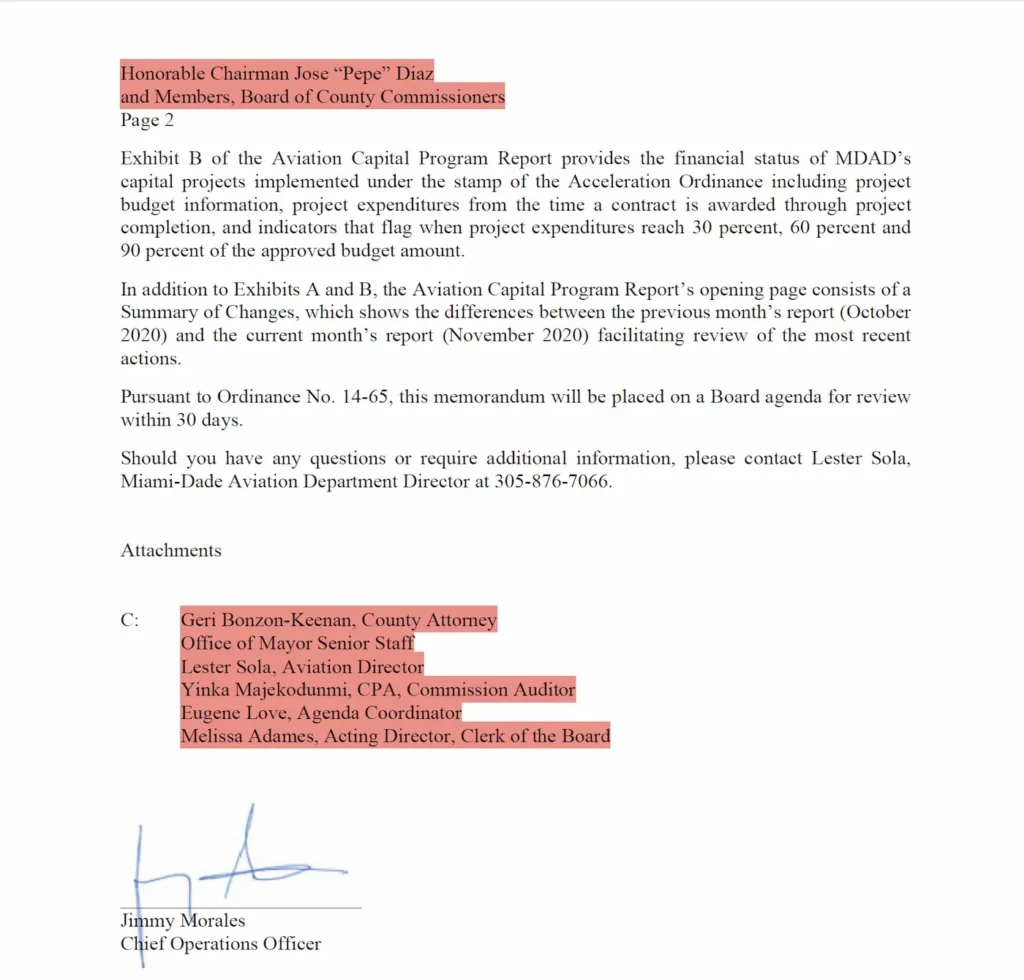
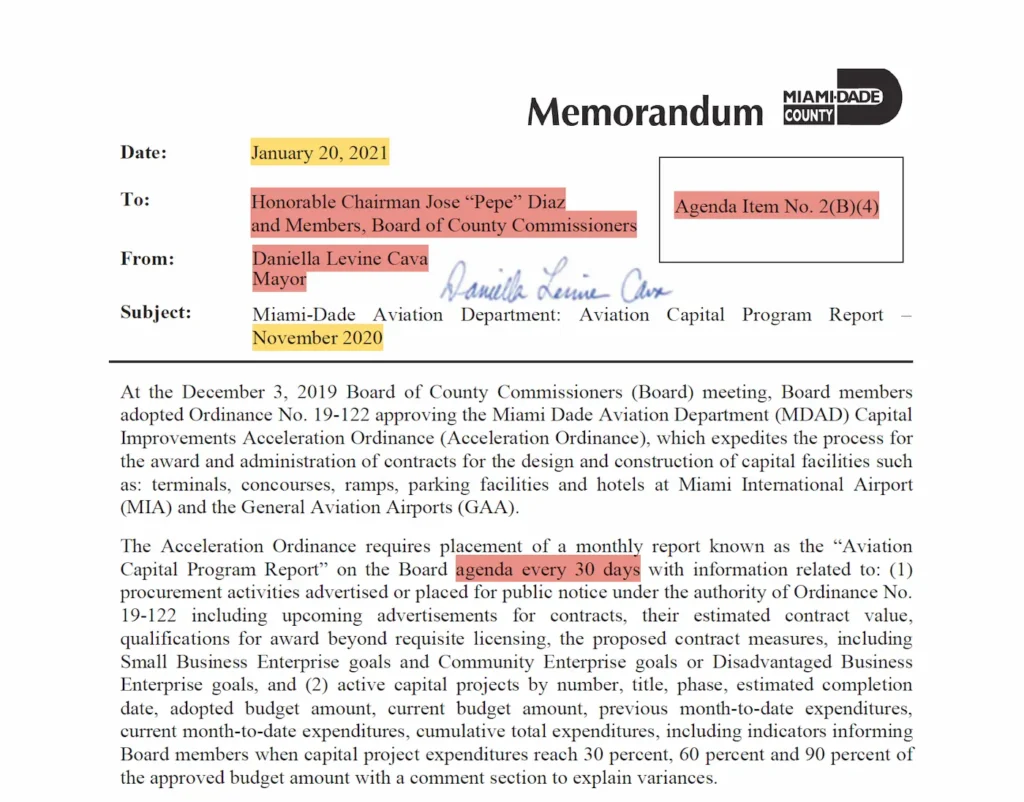
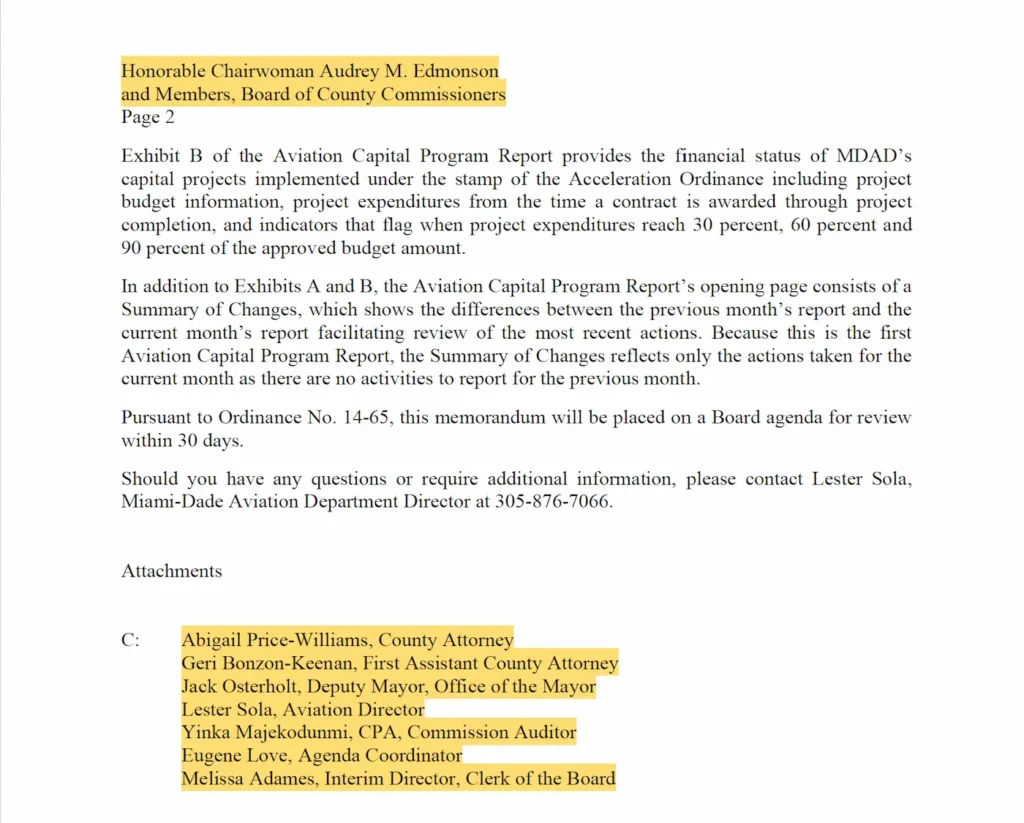
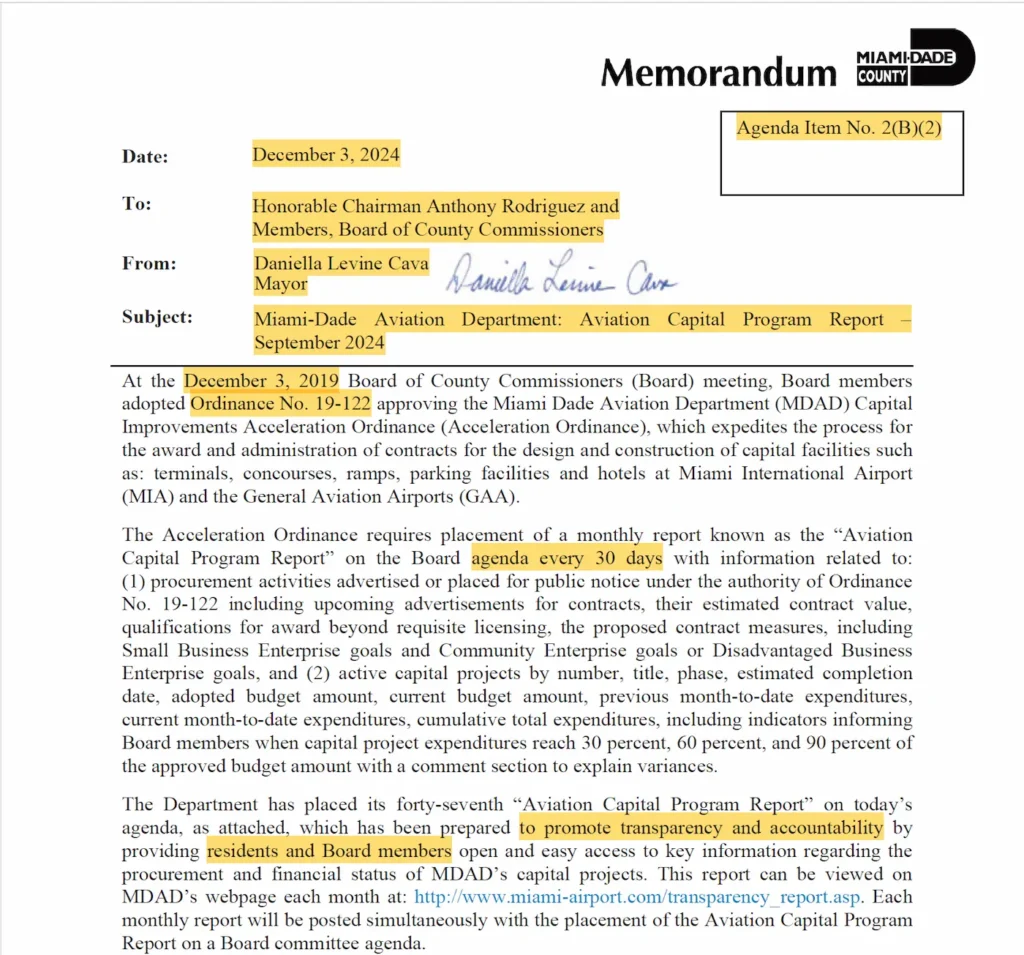
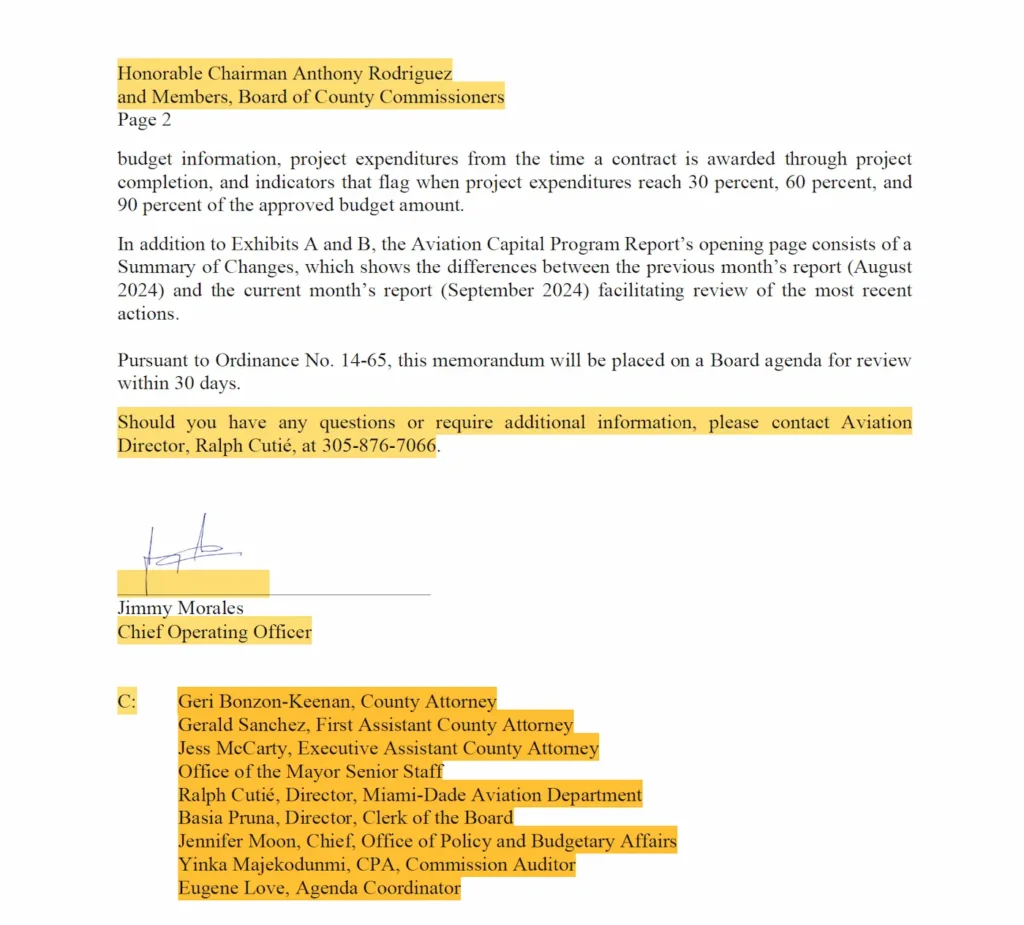
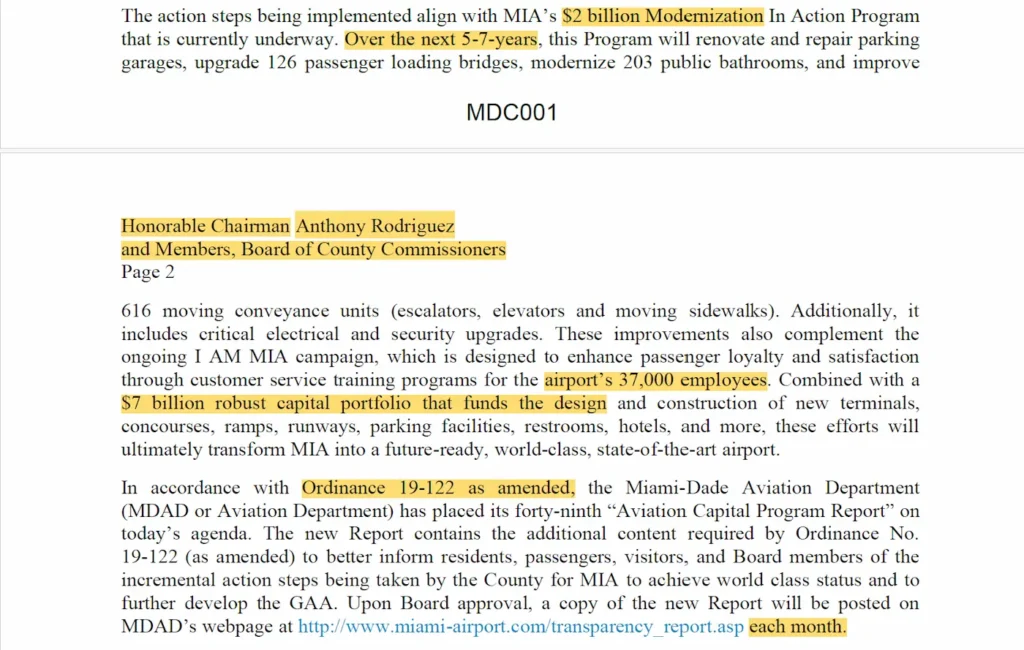
3. Conclusions
Ordinance No. 19-122, or the Capital Improvements Acceleration Ordinance, was designed to streamline airport infrastructure projects and at the same time ensure transparency through a monthly report on progress and contract awards.
Since its approval in December 2019, a comparison between the publication of reports on the official website and the required frequency has shown that the requirement to present a report every 30 days, along with the relevant data that must be reflected in such reports, is not strictly fulfilled. This suggests a possible non-compliance on the part of the Miami-Dade County administration and/or the Aviation Department.
A review of the sequence of reports from 2020 to August 2024 confirms the delays and inconsistencies that point to a gap in the required monthly accountability.
In short, although Ordinance No. 19-122 aims to increase efficiency in capital improvement projects and promote accountability before the commissioners and the public, the evidence shows that its implementation has been deficient. Therefore, a call is made to the competent authorities to review, adjust, and fully adhere to the current legal provisions to restore transparency and public trust in the processes of contracting and developing airport infrastructure in Miami-Dade.
Get Involved and Make Your Voice Heard in Miami-Dade!
Dear residents of our county, your voice is essential for building a prosperous and fair community. Miami-Dade is not only where we live, work, and raise our families, but also the place where our opinions and actions can make a difference.
We invite you to stay informed about the issues affecting our neighborhoods and to actively participate in the decisions made at the local level. Attend the Board of County Commissioners meetings, share your views, and make your concerns heard. By raising your voice in these meetings, you help shape public policies, promote infrastructure improvements—or propose others, such as the new airport in Miami-Dade—and ensure the quality of the services we all enjoy.
Stay updated and learn about acts of corruption and violations of law and order, like those that have emerged at the Port of Miami! Keep yourself informed to know how they affect our community and speak out to promote transparency and justice.
Stay in permanent contact with the people you have chosen to represent you. Your commissioners are there to listen to your concerns, suggestions, and projects that benefit the community. Remember that a close and effective government is one in which citizens and authorities engage in constant dialogue, jointly creating solutions and responding to real community needs.
Your participation strengthens local democracy and ensures that the priorities of residents are taken into account. Join the conversations, express your ideas, and let’s work together for a stronger and more committed Miami-Dade!
Want more post like this?
Head over to our homepage for the latest updates from South Florida and beyond:











